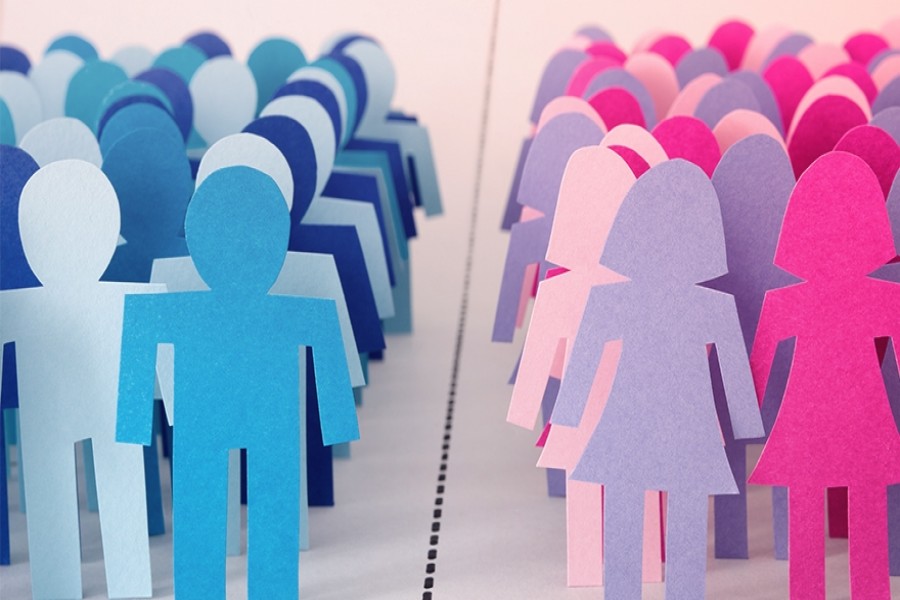In Bangladesh, the distribution of household work and child-care mirrors traditional perceptions of men and women's roles in the family. According to the Bangladesh Bureau of Statistics (2018), women on average performs 3.43 times more unpaid domestic care work than men, which limits the scope to participate in productive activities, and creates time poverty for women. Child marriage is prevalent with spillover effects including early pregnancy, poor health and nutrition and limited participation in economic activities. As noted in the Bangladesh Demographic Health Survey (2017-18), 59 per cent of women aged 20-24 were married before age 18. COVID-19 has further exacerbated these inequalities. School closures and economic strains caused by COVID-19 have left women and girls poorer, out of school and out of jobs, and more vulnerable to forced marriage and other forms of gender based violence as found by the UN Women COVID-19 Bangladesh Rapid Gender Analysis in 2020.
Recognising gender inequality as a critical factor impacting household poverty, food security, and resilience, USAID's 'Nobo Jatra' - new beginning' project, implemented by World Vision in Bangladesh designed and executed a deeply contextualised male engagement activity titled 'Family Well-Being and Prosperity'. The activity focused on improving and supporting healthy family relationships and well-being by backing gender equality and non-violence. Through male engagement, the project created safe spaces for husbands and wives to reflect and promote balanced, respectful relationships, support gender equality, non-violence and discourage child marriage. Sessions are spread over six months and couples meet with a facilitator every fortnight for sessions that are interactive and cover a range of topics like masculinity and its impact, attitudes and behaviours related to equality at home, joint decision making and skills to communicate better. Couples also learned about the harms of gender based violence, particularly child marriage and are encouraged to share household responsibilities and to spend quality time with their children.
"Think about a bicycle," says Jayantha Das, a male engagement participant, "it has two wheels. If one wheel is damaged or leaky, it won't work anymore. The husband and wife are like the wheels of the bicycle. If someone doesn't feel happy, the household could be damaged."
"Before participating in Nobo Jatra," says Parbati, wife of Jayantha, "I didn't imagine our relationship could be like this. My husband has changed a lot. He helps me in childcare and household works. He never did this in our last four years of married life".
Similar to the Das family, 9,814 couples have graduated through male engagement for gender equality sessions. Couples become catalysts, sharing their knowledge with others in the area and setting a good example to their own children. When Nobo Jatra first launched its programme in 2015, only 8.3 per cent of men thought that they should share household and childcare tasks. Today, over 92 per cent of men say that husbands and wives should work together on household chores and caregiving for children.
A study commissioned by Nobo Jatra in 2020 titled 'Sustained impact and changes in south-west Bangladesh' found evidence of positive changes in perceptions through participation in the male engagement activity. Over 89 per cent of men think that women should be consulted on household budgeting and purchases in comparison to a baseline value of 43.30 per cent. Over 44 per cent of men think that women should be able to access markets, health care services, and other public locations without restrictions or prior consultation in comparison to a baseline value of 18.30 per cent. The majority of participants (male 98.1 per cent and female 94.7 per cent) agreed that child marriage is harmful for adolescent girls and that it is a punishable offence. 90.2 per cent of fathers are spending up to 6 hours per day with their children.
The male engagement approach has shown that changing perceptions and encouraging equitable relationships at the household level can be a catalyst for a society where women and girls have equal opportunities. To sustain the impact and positive changes seen so far, World Vision Bangladesh is working to embed the male engagement for gender equality approach and key messages into Government Child Marriage Prevention Committees at the union, sub district and district level, and into existing programmess of the Department of Women Affairs. Parallel to this, there is also a clear need for more gender-targeted policymaking to reduce gender gaps and recognise unpaid care work of women. Women and girls need better protection in the labour market, at home and in public spaces, so that they are able to continue their education, participate in economic and social activities and achieve a more equal future in a COVID-19 world.
Mehzabin Rupa and Rubayat Ahsan are with Nobo Jatra, World Vision Bangladesh. The contents are the sole responsibility of World Vision and do not necessarily reflect the views of the United States Government.


